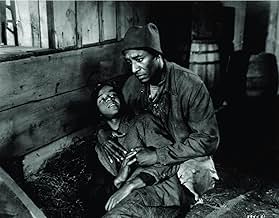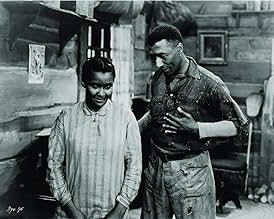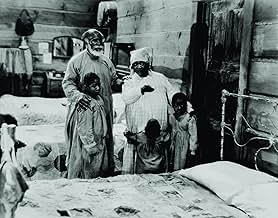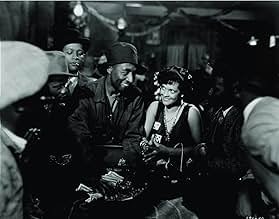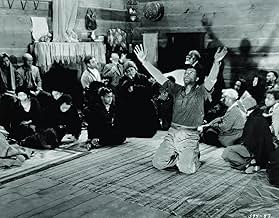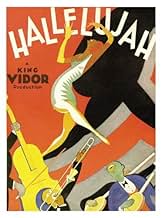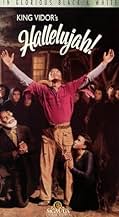AVALIAÇÃO DA IMDb
6,7/10
2,1 mil
SUA AVALIAÇÃO
Adicionar um enredo no seu idiomaA sharecropper decides to become a preacher after falling for a vamp from the city.A sharecropper decides to become a preacher after falling for a vamp from the city.A sharecropper decides to become a preacher after falling for a vamp from the city.
- Direção
- Roteiristas
- Artistas
- Indicado a 1 Oscar
- 3 vitórias e 1 indicação no total
Matthew 'Stymie' Beard
- Child
- (não creditado)
Evelyn Pope Burwell
- Singer
- (não creditado)
Eddie Conners
- Singer
- (não creditado)
William Allen Garrison
- Heavy
- (não creditado)
Eva Jessye
- Singer
- (não creditado)
Sam McDaniel
- Adam
- (não creditado)
Clarence Muse
- Church Member
- (não creditado)
Avaliações em destaque
There's something hypnotic about good preaching. All that passion, all that energy, whether it's in film or in person, has a cumulative power. It's hard to doubt the spreading power of religion when you see Daniel L. Haynes (this film) or Robert Duvall ("The Apostle"), or read the sermon at the end of "The Sound and the Fury." Feverishly, they try and communicate God's word. They rant, they rave, they speak quickly and with an undeniable amount of integrity. They get the crowd going, usually in whoops and outbursts, and one man's conversation with God becomes a community event. (Indeed, the power of a worked-up crowd is a powerful tool in and of itself).
That's what's so terrific about King Vidor's "Hallelujah." Everyone's up in arms about one thing or another in this movie, whether it's money, sex, or Jesus. Early in the film there's a rather ludicrous scene where the hero's brother is accidentally killed, due to the hero's folly and hubris. That's his Sin, for which he must Redeem Himself Before God. There's also a woman who represents Temptation, who leads him astray time and time again. In the end there's an extended chase through a swamp, that would be done again in Kurosawa's "Stray Dogs."
All of that's well and good, but the film really peaks during the sermon sequences. Done wrong, sermons in movies usually pass by unnoticed, or are used as a clothsline to hang lame jokes about apathetic churchgoers. Done right, as in this film, "The Apostle," and the most unusual ones in "Beloved," they can be as captivating as if you were really in attendance. It's a testament to the power of the motion picture.
That's what's so terrific about King Vidor's "Hallelujah." Everyone's up in arms about one thing or another in this movie, whether it's money, sex, or Jesus. Early in the film there's a rather ludicrous scene where the hero's brother is accidentally killed, due to the hero's folly and hubris. That's his Sin, for which he must Redeem Himself Before God. There's also a woman who represents Temptation, who leads him astray time and time again. In the end there's an extended chase through a swamp, that would be done again in Kurosawa's "Stray Dogs."
All of that's well and good, but the film really peaks during the sermon sequences. Done wrong, sermons in movies usually pass by unnoticed, or are used as a clothsline to hang lame jokes about apathetic churchgoers. Done right, as in this film, "The Apostle," and the most unusual ones in "Beloved," they can be as captivating as if you were really in attendance. It's a testament to the power of the motion picture.
One isn't sure if director King Vidor does more harm than good with the first major film studio sound production featuring an all black cast. While the film marks a progressive first in the industry, negative stereotypes abound. The story (also by Vidor) concerns a family of sharecroppers with the oldest son Zeke as the film's main character. It's a back breaking existence amid orderly squalor but the family retains high spirits in spite of their downtrodden social status.
After picking their cash crop Zeke along with his younger brother Spunk bring it to market to sell. With cash in hand Zeke decides to let off a little steam at a local dive where he is targeted as a rube by Chick a bar room seductress and her accomplice Hot Shot. He is quickly relieved of his cash by the two and things go from bad to worse when Spunk coming to fetch Zeke is accidentally shot and killed. A devastated Zeke turns to preaching and achieves a sizable following when Chick re-enters and diverts Zeke's spiritual vocation back to carnal desire. He once again abdicates his responsibility and runs off with Chick who soon bored with him once again takes up with Hot Shot, this time with disastrous results for all.
Hallelujah is a film of great power filled with scenes of incredible passion. A mass baptism down by a lake featuring hundreds of extras and a Saturday night church revival are riveting and daring in their intensity and energy. The church scene in particular is filmed and recorded with an audacious energy unlike any other from the early sound period. The wildness of this scene does however call into question the depiction of American blacks in the twenties by Hollywood. Segregation was very much a part of the American way back then and for many whites this film may have been their first exposure to black culture beyond jazz which was quickly dominating the country's music scene. In addition Zeke the male lead is portrayed as incapable of holding in check his libido while the female lead Chick is presented as an immoral, shameless, conniver.
In the lead roles Daniel Haynes as Zeke is not much of an actor but he does have an imposing presence and fine baritone voice. Nina Mae McKinney as Chick is a bit over the top most of the time but one has to admire the pluck of her monomania, particularly in one scene where she takes a fireplace poker to Hot Shot, informing him in no uncertain terms that nothing will get in her way of being saved. Fanny Belle DeKnight as Mammy Johnson nobly portrays the family matriarch while Rosa Spivy as Johnson's other love interest suffers with stoic dignity and beatific understanding.
Vidor must be commended for his desire to make this economically unsound project. He was as big as any director in Hollywood (The Crowd, The Big Parade) at the time and he waived his salary to get it made. His insight into black culture is respectful but at times naively heavy handed. With the best of intentions he does stumble along the way but with Hallelujah he presents us with a valuable document about race perception in that period as well as give a segment of uniquely American culture an opportunity and a stage to be more visible. The problem is there is a good deal of negativity to be found in Vidor's sincere and bold effort.
After picking their cash crop Zeke along with his younger brother Spunk bring it to market to sell. With cash in hand Zeke decides to let off a little steam at a local dive where he is targeted as a rube by Chick a bar room seductress and her accomplice Hot Shot. He is quickly relieved of his cash by the two and things go from bad to worse when Spunk coming to fetch Zeke is accidentally shot and killed. A devastated Zeke turns to preaching and achieves a sizable following when Chick re-enters and diverts Zeke's spiritual vocation back to carnal desire. He once again abdicates his responsibility and runs off with Chick who soon bored with him once again takes up with Hot Shot, this time with disastrous results for all.
Hallelujah is a film of great power filled with scenes of incredible passion. A mass baptism down by a lake featuring hundreds of extras and a Saturday night church revival are riveting and daring in their intensity and energy. The church scene in particular is filmed and recorded with an audacious energy unlike any other from the early sound period. The wildness of this scene does however call into question the depiction of American blacks in the twenties by Hollywood. Segregation was very much a part of the American way back then and for many whites this film may have been their first exposure to black culture beyond jazz which was quickly dominating the country's music scene. In addition Zeke the male lead is portrayed as incapable of holding in check his libido while the female lead Chick is presented as an immoral, shameless, conniver.
In the lead roles Daniel Haynes as Zeke is not much of an actor but he does have an imposing presence and fine baritone voice. Nina Mae McKinney as Chick is a bit over the top most of the time but one has to admire the pluck of her monomania, particularly in one scene where she takes a fireplace poker to Hot Shot, informing him in no uncertain terms that nothing will get in her way of being saved. Fanny Belle DeKnight as Mammy Johnson nobly portrays the family matriarch while Rosa Spivy as Johnson's other love interest suffers with stoic dignity and beatific understanding.
Vidor must be commended for his desire to make this economically unsound project. He was as big as any director in Hollywood (The Crowd, The Big Parade) at the time and he waived his salary to get it made. His insight into black culture is respectful but at times naively heavy handed. With the best of intentions he does stumble along the way but with Hallelujah he presents us with a valuable document about race perception in that period as well as give a segment of uniquely American culture an opportunity and a stage to be more visible. The problem is there is a good deal of negativity to be found in Vidor's sincere and bold effort.
In 1929, MGM began the process of converting to sound. They were almost the "latecomers" of sound conversion compared to their competitors over at the Warners lot; Warners' Vitaphone was pretty much in full swing by 1929 after having experimented with orchestral sound on film in 1926 in "The Better 'Ole" and "Don Juan" and then with actual voice embedment on film in "The Jazz Singer" the following year.
Even for such a major film studio like MGM, the cost was almost prohibitive, so Louis B. Mayer was skeptical about financing a major film epic featuring an all black cast. In the first half of the 20th Century, the major film studios catered mostly to white audiences, so a project of this nature was almost unheard of. Director, King Vidor was personally convinced that this film would be a success at the box office that he offered to match MGM dollar for dollar in producing this film. That said, the executives at MGM agreed, reluctantly, to take on this project.
I was totally surprised by the candidness of the material. From the way the major studios depicted black people as individuals of little or no importance, usually portraying them in a very negative way, I was at first skeptical. I expected more singing, dancing and stereotyping. Little did I know what a surprise I was in for! MGM could not have done a better job at portraying individuals with such humanistic qualities. As with most backdrops featuring blacks, it takes place in the cotton fields of the South; the motion picture industry failed miserably to depict black urban or middle class life until decades later.
Amazingly, most, if not all, of these actors were untested individuals on the screen or stage. Vidor's direction, along with these actors' willingness to succeed on the screen, created a work of art for the cinema. A huge box office success, "Hallelujah" was an oasis in an otherwise all-white world of big business cinema. It is a shame that the movie moguls at the time did not take further advantage of the acting talents of minorities.
Leonard Maltin could not have put it more succinctly when he said about Hallelujah: "King Vidor's early talkie triumph, a stylized view of black life focusing on a Southern cotton-picker who becomes a preacher but retains all-too-human weaknesses." Definitely a home run! A must see!
Even for such a major film studio like MGM, the cost was almost prohibitive, so Louis B. Mayer was skeptical about financing a major film epic featuring an all black cast. In the first half of the 20th Century, the major film studios catered mostly to white audiences, so a project of this nature was almost unheard of. Director, King Vidor was personally convinced that this film would be a success at the box office that he offered to match MGM dollar for dollar in producing this film. That said, the executives at MGM agreed, reluctantly, to take on this project.
I was totally surprised by the candidness of the material. From the way the major studios depicted black people as individuals of little or no importance, usually portraying them in a very negative way, I was at first skeptical. I expected more singing, dancing and stereotyping. Little did I know what a surprise I was in for! MGM could not have done a better job at portraying individuals with such humanistic qualities. As with most backdrops featuring blacks, it takes place in the cotton fields of the South; the motion picture industry failed miserably to depict black urban or middle class life until decades later.
Amazingly, most, if not all, of these actors were untested individuals on the screen or stage. Vidor's direction, along with these actors' willingness to succeed on the screen, created a work of art for the cinema. A huge box office success, "Hallelujah" was an oasis in an otherwise all-white world of big business cinema. It is a shame that the movie moguls at the time did not take further advantage of the acting talents of minorities.
Leonard Maltin could not have put it more succinctly when he said about Hallelujah: "King Vidor's early talkie triumph, a stylized view of black life focusing on a Southern cotton-picker who becomes a preacher but retains all-too-human weaknesses." Definitely a home run! A must see!
I probably don't need to go into the historical facts about this movie or the plot, as this had probably been expunded in numerous other comments. Personally I think that Hallelujah is a beautiful and powerful film, sympathetic to African Americans, and I think it's remarkable that it was produced at all.
Hallelujah is a huge production, with hundreds of extras. The cast was made up of mostly unknowns. Cast members like Fally Belle McKnight and Victoria Spivey apparently never made any other films, and leads Daniel L. Haynes and Nina Mae McKinney were obviously getting started. The cast is very good, I thought, especially Spivey (a veteran of the stage) as Rose. Haynes is okay in the beginning, seeming a little uneven in his role as well-meaning rogue Zeke, but the final scenes allow him to prove the commanding presence he could muster as an screen presence. Nina Mae McKinney is a power-house. A short, curvy beauty with an interesting voice, she has something of a young Myrna Loy. In fact, I just recently saw a still from a Loy film called The Squall where Loy looks an awful lot like McKinney.
Movies like Hallelujah are an acquired taste. When I first saw it, I was distracted by the crudeness of the sound, the jagged editing and the overall unevenness of the movie. Sure, two or three years later, Hollywood was turning out glossy productions like Red Dust and Blond Venus, with highly polished editing, clear sound and more mobile camera-work, but this is 1929. Sound film-making techniques had yet to be smoothed out. The crinkles of a young process actually add charm to this film, if you know to expect them.
I'll admit as well that, when I first saw Hallelujah, I was irritated by the voices. There's a lot of screeching from the women, and a great deal of mumbling as well. A second viewing, though, allows one to see past these "irritating" aspects and appreciate the voices for what they are. This way, Fanny Belle McKnight's agonized cries of sorrow and her singing the children to sleep is more touching than it is grating.
It's hard to know what else to say about the film. For all it's shortcomings, it's a touching film, lyrical even. I think it's a wonderful production, and I doubt it would not have been made much differently by a black director. Plus, one must agree, King Vidor was a far better craftsman than Oscar Micheaux. 9/10
Hallelujah is a huge production, with hundreds of extras. The cast was made up of mostly unknowns. Cast members like Fally Belle McKnight and Victoria Spivey apparently never made any other films, and leads Daniel L. Haynes and Nina Mae McKinney were obviously getting started. The cast is very good, I thought, especially Spivey (a veteran of the stage) as Rose. Haynes is okay in the beginning, seeming a little uneven in his role as well-meaning rogue Zeke, but the final scenes allow him to prove the commanding presence he could muster as an screen presence. Nina Mae McKinney is a power-house. A short, curvy beauty with an interesting voice, she has something of a young Myrna Loy. In fact, I just recently saw a still from a Loy film called The Squall where Loy looks an awful lot like McKinney.
Movies like Hallelujah are an acquired taste. When I first saw it, I was distracted by the crudeness of the sound, the jagged editing and the overall unevenness of the movie. Sure, two or three years later, Hollywood was turning out glossy productions like Red Dust and Blond Venus, with highly polished editing, clear sound and more mobile camera-work, but this is 1929. Sound film-making techniques had yet to be smoothed out. The crinkles of a young process actually add charm to this film, if you know to expect them.
I'll admit as well that, when I first saw Hallelujah, I was irritated by the voices. There's a lot of screeching from the women, and a great deal of mumbling as well. A second viewing, though, allows one to see past these "irritating" aspects and appreciate the voices for what they are. This way, Fanny Belle McKnight's agonized cries of sorrow and her singing the children to sleep is more touching than it is grating.
It's hard to know what else to say about the film. For all it's shortcomings, it's a touching film, lyrical even. I think it's a wonderful production, and I doubt it would not have been made much differently by a black director. Plus, one must agree, King Vidor was a far better craftsman than Oscar Micheaux. 9/10
Nina Mae McKinney portrayed Chick in this movie. The untrained, natural singing, dancing, acting talent stole everyone's heart who saw this movie, even till this day she's still winning hearts. A great actress, after this movie people named her "The Black Garbo" and "The Dark Clara Bow". Being the first black actress, she had to represent her race well, and show that Blacks could act, and show Hollywood that Blacks could hold their own on the silver screen. Norma Shearer, John Gilbert, Irving Thalberg, and King Vidor was breath-taken by her acting, and after her you saw many white actresses copying her style, the hands on the hips and facial expressions. This movie isn't stereotypical at all, its about Black Life in the South, the music and styles of the time. Nina Mae was promised many more movies, but never did anything else, but singing apperances, shorts, and maid apperances. But she did get to show her acting in the independent black movies. If you ever get to see them, you won't be sorry. People say this movie was ahead of its time, maybe so, But Nina was lucky she got to show all her talents, singing, dancing, comedy, and acting. Even Blacks don't get to show all of that today. People say that Lena Horne opened the doors, thats false, Nina Mae McKinney did, representing the Black race well, and showing that we could act, open the doors for Blacks in the future in Hollywood.
Você sabia?
- CuriosidadesAlthough this film is frequently touted as the first black-cast film produced in Hollywood, it is actually predated by the more obscure Hearts in Dixie (1929).
- Erros de gravaçãoWhen Zeke confronts Chick and Hot Shot and strong-arms them in front of the crowd, the shadow of the microphone falls across Hot Shot as he is pushed to the background of the scene and tries to regain his composure. The shadow of the boom is also visible falling across the extras behind him.
- Versões alternativasMGM also issued this movie in a silent version, with Marian Ainslee writing the titles.
- ConexõesFeatured in Fejezetek a film történetéböl: Amerikai filmtípusok - A zenés film (1989)
- Trilhas sonorasSometimes I Feel Like a Motherless Child
(uncredited)
Traditional Spiritual
Sung offscreen during the opening credits
Principais escolhas
Faça login para avaliar e ver a lista de recomendações personalizadas
- How long is Hallelujah?Fornecido pela Alexa
Detalhes
- Tempo de duração1 hora 49 minutos
- Cor
- Proporção
- 1.20 : 1
Contribua para esta página
Sugerir uma alteração ou adicionar conteúdo ausente



